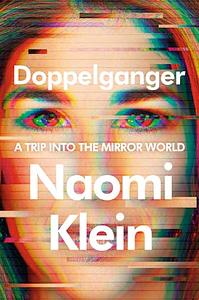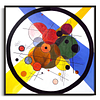Take a photo of a barcode or cover
challenging
emotional
tense
slow-paced
Definitely a challenging read. An unapologetic command to look at the part we perso ally play in the world's tragedies.
challenging
informative
reflective
medium-paced
challenging
dark
emotional
funny
informative
inspiring
reflective
medium-paced
challenging
informative
reflective
tense
medium-paced
dark
informative
reflective
medium-paced
dark
informative
reflective
This is one of those books where I'd have to pause at the end of some paragraphs, put the book down, and stare into space while saying "huh" out loud. I don't do that very often when I read.
I think it'd be easy to be dismissive of this book and say, "Well, I already know how terrible everything in the world is; I don't need to read this book," but man, many ways Klein analyzes doppelgangers and applies this phenomenon to our current society and our history is fascinating, thoughtful, and often funny. This book got REALLY dark at points, and it's a tough read overall, but it's worth it.
I think it'd be easy to be dismissive of this book and say, "Well, I already know how terrible everything in the world is; I don't need to read this book," but man, many ways Klein analyzes doppelgangers and applies this phenomenon to our current society and our history is fascinating, thoughtful, and often funny. This book got REALLY dark at points, and it's a tough read overall, but it's worth it.
challenging
emotional
informative
reflective
slow-paced
I feel like everyone should be reading this. Klein so aptly describes our ailing political climate, grounding her analysis with a healthy dose of historical context and humour. The scope of the book is broad, but its throughline is the binaristic discourses that define themselves in opposition to each other. These discourses end up dancing around each other, instead of the real issues of toxic neoliberal ideologies, capitalist extraction, and climate disaster that surround us.
Something so refreshing about this book was Klein's self-awareness about her own implication in the issues she describes. She doesn't just point fingers at an evil "other"; she highlights how the very temptation to do that leads to a lot of words, but not a lot of action, and stunts the coalition-building that can actually make a difference.
I saved a lot of quotes from this book to reflect on later, but here are some favourites:
On conspiracy theories: "The words she was saying were essentially fantasy. But emotionally, to the many people now listening to her, they clearly felt true" (86)
On cancel culture: "I am also unsettled by the ease with which we can turn off other humans. I fear that there is something habit-forming about making other people disappear with a keystroke" (110)
On political polarization: "It is as if when something becomes an issue in the Mirror World, it automatically ceases to matter everywhere else. This has happened on so many issues that I sometimes feel as if we are tethered to each other as reverse marionettes: their arm goes up, ours goes down. We kick, they hug" (121)
A potential critique is that Klein could've explored her arguments with more depth, but I think the book stands up as a piece of public intellectualism, laying out a general theory that others can continue to expand on. Plus, if Klein's goal is make a broad appeal to readers to listen, collaborate, and act, I find her accessible, personable style to be an asset.
Something so refreshing about this book was Klein's self-awareness about her own implication in the issues she describes. She doesn't just point fingers at an evil "other"; she highlights how the very temptation to do that leads to a lot of words, but not a lot of action, and stunts the coalition-building that can actually make a difference.
I saved a lot of quotes from this book to reflect on later, but here are some favourites:
On conspiracy theories: "The words she was saying were essentially fantasy. But emotionally, to the many people now listening to her, they clearly felt true" (86)
On cancel culture: "I am also unsettled by the ease with which we can turn off other humans. I fear that there is something habit-forming about making other people disappear with a keystroke" (110)
On political polarization: "It is as if when something becomes an issue in the Mirror World, it automatically ceases to matter everywhere else. This has happened on so many issues that I sometimes feel as if we are tethered to each other as reverse marionettes: their arm goes up, ours goes down. We kick, they hug" (121)
A potential critique is that Klein could've explored her arguments with more depth, but I think the book stands up as a piece of public intellectualism, laying out a general theory that others can continue to expand on. Plus, if Klein's goal is make a broad appeal to readers to listen, collaborate, and act, I find her accessible, personable style to be an asset.
informative
medium-paced
challenging
informative
medium-paced
Super interesting. Surprisingly this is my first Klein novel despite being in climate science and her backlog of books on the climate crisis (which I will definitely be reading now!). I didn't really know what I was getting myself into but I learnt a great deal. I don't think I'd do the book any justice by trying to summarise it, so I will just encourage you to read it. Marked down by half a star because I sometimes felt that the flow between ideas was a bit clunky.






